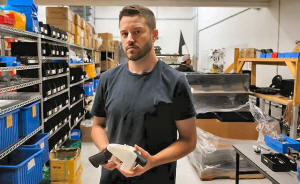|
Creator of 3-D printed guns flies to
Taiwan amid U.S. sex assault accusation
 Send a link to a friend
Send a link to a friend
[September 20, 2018]
By Gina Cherelus
(Reuters) - A Texas man at the center of a
legal battle over his plan to make instructions available for 3-D
printed plastic guns flew to Taiwan after learning police in Austin were
investigating an accusation he had sex with an underage girl, police
said on Wednesday.
Cody Wilson, 30, was placed under investigation after a counsellor on
Aug. 22 told police that a 16-year-old girl had said she was paid $500
to have sex with Wilson at an Austin hotel, Austin Police Commander Troy
Officer said at a news conference.
Police later interviewed the girl and on Wednesday obtained a warrant
for Wilson's arrest, but by then he had caught a flight to Taiwan,
Officer said.
"We know Mr. Wilson frequently travels for business. We don't know why
he went to Taiwan," Officer said. "But we do know before he left he was
informed by a friend of the victim that she had spoken to police and the
police were investigating him for having sex with a minor."
Taiwan does not have an extradition treaty with the United States.
The island's Criminal Investigation Bureau told Reuters on Thursday that
it had not received any request on the matter from the United States,
and it was not immediately clear whether Wilson was in Taiwan.
Wilson founded the group Defense Distributed, which has been selling 3-D
firearm-design files on flash drives via regular mail after a U.S.
federal judge barred the group from posting the blueprints online.
A lawyer for Wilson did not immediately respond to a request for
comment.
In an Aug. 27 interview with police, the teenager said she had exchanged
messages with a man using the screen name "Sanjuro" on
SugarDaddyMeet.com, according to a police affidavit. The girl said "Sanjuro"
later revealed his real name, described himself as a "big deal" and
exchanged nude photos with her.The girl said she and Wilson had sex at a
local hotel on Aug. 15, according to the document. Her statement was
corroborated with security video footage and records showing Wilson
registered as a guest at the hotel that night, police said.
[to top of second column]
|

Cody Wilson poses with an example of a 3-D printed gun, called the
"Liberator," which his company Defense Distributed designs at his
factory in Austin, Texas, U.S. August 1, 2018. REUTERS/Kelly West

Wilson sparked a legal battle in 2015 after he challenged a
government ban on posting the blueprints for printing 3-D guns to
the internet, claiming it infringed on his rights to free speech and
to bear arms.
The Trump administration earlier this year reached a settlement
lifting the ban for Defense Distributed. But 19 states and the
District of Columbia challenged that decision in court in July,
arguing that publishing the blueprints would allow criminals easy
access to unregistered weapons.
Last month, U.S. District Judge Robert Lasnik in Seattle ordered
Wilson not to post blueprints online. Instead, Wilson began selling
them by mail, saying the judge's order did not bar him from doing
so.
(The story was refiled to correct spelling and gramatical errors in
the sixth paragraph)
(Reporting by Gina Cherelus in New York; additional reporting by
Alex Dobuzinskis in Los Angeles and Yimou Lee in TAIPEI; Editing by
Bernadette Baum and Lisa Shumaker)
[© 2018 Thomson Reuters. All rights
reserved.]
Copyright 2018 Reuters. All rights reserved. This material may not be published,
broadcast, rewritten or redistributed.
Thompson Reuters is solely responsible for this content. |